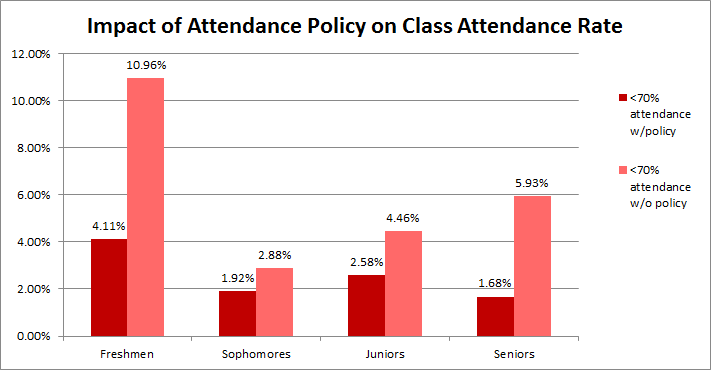Universities and academics have reported significant problems with student attendance in recent years. Post-pandemic, institutions are struggling to get students back to class which can impact student success. As a result, many are experiencing a strong demand for flexible attendance policies and a more hybrid learning approach.
Part of the frustration around student attendance is due to research which shows that students who do show up for class are more likely to succeed academically, and feel a sense of belonging within their institution. This furthers their likelihood of having a positive higher education experience.
As well as this, there is evidence to support the view that implementing attendance policies results in better student attendance and that student absences often result in poorer grades.
What is a Student Attendance Policy?
A student attendance policy is a set of rules and expectations set out by institutions around student attendance at lectures or tutorials. A student attendance policy will generally include details on minimum attendance standards, authorised absences, the student attendance management system, and extenuating circumstances procedures.
By providing this clear set of guidelines, universities can remove confusion and stress around student attendance, encourage student engagement and promote self-regulated learning.
Best Practices Around Student Attendance Policies
In response to recent challenges, some institutions have started adapting their student attendance policies. Many are focusing on their approach to student wellbeing and providing more holistic student support via more flexible attendance policies.
Some strategies include allowing students to miss a number of classes and still receive 100% attendance. Others allow students to miss a few classes, so long as they still make 80% of sessions through the year.
Often these policies require that students justify their absence, which some academic argue can still disadvantage the most at-risk students.

Percentage of students who attended less than 70% of classes, with and without an attendance policy.
Evidence from this study indicates a student attendance policy encourages higher student attendance rates.
A suggestion from one student survey, is to allow students several ‘free’ absences throughout the academic year, that do not require approval and do not carry any penalties. This is a popular choice among students and academics. It may also be worth considering a student attendance reward system. The same student survey found that a third of students went to class when they got credit for attending.
Can a Student Attendance Policy Boost Student Success?
The results from the student surveys above indicate one key thing:
A required-attendance policy helps students get to class, and students who attend class are more likely to succeed.
By implementing a flexible student attendance policy with clear expectations, students have a benchmark that encourages them to get the most from their attendance. As a result, institutions can improve student attendance, prioritise student wellbeing and encourage a positive student experience.
The right student attendance policy can also benefit student mental health. One common issue for students who struggle with their mental health at university is a lack of structure. Research regularly reminds us of the importance of maintaining a regular routine during tough times.
When asked how attending versus skipping class affected their mental health, the majority of students said that attending class made them feel better, and skipping made them feel worse.
Another benefit of a student attendance policy is a reduced load on student support services. With a policy in place, institutions can focus resources on students who are repeatedly absent and reach out to them to provide extra support.
By helping students see that attending class can be a path to better mental health, institutions can improve:
- Student attendance
- Academic success
- Student wellbeing
- Student support services
However, simply adopting a student attendance policy may not be enough to drive noticeable improvements in student success. A student attendance management system, with early alerts for at-risk students is crucial to the effectiveness of your student attendance policy. Without this final piece of the puzzle, it is hard to turn a student attendance policy into a productive student success strategy

What is a Student Attendance Management System?
A student attendance management system is technology that assists in the recording, monitoring and reporting of student attendance. A student attendance management system takes the administrative work out of managing student attendance. The system automates the process and makes it more effective and efficient.
With a student attendance management system, universities and colleges can take attendance at any student events more easily. This includes events that are on-campus, online or off-campus. There are also a range of solutions for this – BLE Bluetooth Beacons, card readers or GPS Connection.
The Benefits of a Student Attendance Management System
There are many benefits to a student management system. Firstly, it reduces the administrative time spent recording and reporting on student attendance. It also reduces the error associated with this manual effort.
Secondly, a student attendance management system combines your student attendance data with data analytics. By utilising a student attendance management system, staff gain actionable insights into student attendance trends that can inform scheduling, improve policies, and proactively identify and support struggling students.
Thirdly, a student attendance management system offers extensive reporting capabilities. Universities can easily generate accurate, detailed student attendance reports by individual, course, school and more. This simplifies any compliance or stakeholder reporting requirements around student attendance.
The benefits of a student management system include:
- Reduce administrative time spent collecting, analysing and reporting on student attendance data.
- Remove human error associated with manual data management.
- Gain actionable insights into student attendance trends, behaviours and more, to improve student success, operational efficiencies and institutional excellence.
- Receive student wellbeing alerts for more timely interventions and improved student retention rates.
- Produce extensive reports for compliance obligations.
Conclusion
Student attendance is a crucial and invaluable part of the education process. To highlight this, a student attendance policy can inform students of the benefits of student attendance, encourage engagement and boost student success. To help manage a student attendance policy effectively, consider a student attendance management system.
A student attendance management system can improve elements such as process efficiency, compliance and student support services among others. With the help of these systems, universities can transform their student attendance policy into a strategy for student success, operational efficiency and institutional excellence.










